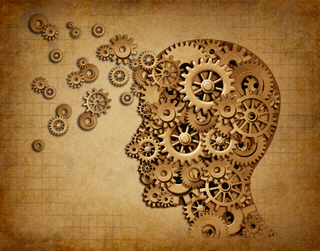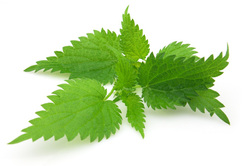
There's currently no way to reverse brain degeneration once it begins, but there are several things you can do to bolster brain health and to provide comfort for those experiencing the difficulties of cognitive degeneration.

Given the sheer numbers, chances are each of us know someone dealing with some form of dementia, either as a caretaker or as a victim. It affects us all.
By definition, dementia is a chronic (mostly irreversible) deterioration of the mind. It can occur at any age, but is often seen affecting the elderly. Though there are many theories as to what is the primary cause of dementia, it most likely is the result of multiple factors, rather than any one in particular. Consequently, the best way to approach optimal mental health is by employing multiple approaches.
Here at the Nourishing Herbalist, we are lovers of the alternative medicine Triumvirate: aromatherapy, homeopathy and herbalism.
Each of these combined with good lifestyle choices and a real food diet can offer tremendous holistic health benefits.
Science has shown that diets rich in omega-3s reduce the risks of Alzheimers as well.
It's no surprise, nourishing foods do just that: nourish.
Someone please pass the pastured butter!
It's important to mention here the likely link between dementia and the use of aluminum materials, whether that be in the form of baking or cooking ware, anti-perspirants, or good ol' aluminum foil. Do yourself a favor and rid your home of the toxin. Check out this great post for ideas on how to replace aluminum foil in your kitchen!
To promote calm in irritated dementia victims, the best oils to include lavender, bergamot and ylang ylang. You can always throw some chamomile into the mix, too.
A few other things to note:
:: Be sure to read our post on where to buy the highest quality essential oils for more information.
:: For more information on how aromatherapy can assist with dementia, read this article about how aromatherapy has assisted in cases of Alzheimers and the various supporting studies.
:: Lastly, one of our favorite herbal companies has a complete listing of oils available for individuals struggling with dementia.
Other herbs that can positively affect dementia patients include kava kava, ginseng (any type), St. John's wort (especially for anxiety and depression), and valerian root (for calm).
Rosemary Gladstar, a renown herbalist, suggests in her book Medicinal Herbs and also in her book Herbal Remedies for Vibrant Health the routine administration of a brain tonic tincture to bolster the health of the brain tissue. Her recipe includes ginko leaf, gotu kola, peppermint, rosemary, and sage.
:: Be sure to read our post on where to buy the best dried herbs for more information.
I have to pause for a moment and say it's a toss-up between herbs and homeopathic remedies as to which method of alternative medicine is really my favorite.
Homeopathy is obviously near and dear to my heart, since that's currently what I'm pursuing a certification in, but the fact is both work; however, homeopathy is gentler with NO side effects. I can't say the same for herbs.
Since most individuals diagnosed with dementia are elderly, homeopathic remedies (and aromatherapy) are great options to try prior to dabbling in the herbal world. Herbs, like prescription drugs, can be dangerous for some and will occasionally interfere with prescription meds. Please use caution and/or consult with a certified herbalist if you plan on ingesting herbs.
However, since homeopathy is completely safe for the layman to try, you can always pick one and hope for the best. I recommend meeting with a homeopath, though, for best results.
Here is a very basic overview of homeopathic remedies I can suggest trying.
For the dementia individual experiencing:
Irritable and restless behavior
- Tarentula Hispanica
- Nux Vomica
- Chamomile
- Crotalus Horridus
Feeling weak, forgetful and defeated
- Anacardium Orientale
- Lycopodium
- Staphisagria
- Phosphoric Acid
Appearing confused, moody, depressed
- Aluminum Oxydata
- Baryta Carbonica
For elderly individuals, I would most likely recommend remedies given in a 6C potency 2-3 times per day for a week or two OR 30C potency daily for a week. For more information, read this post on homeopathic remedies. Note any improvements in cognitive ability or behavior. But again, for best results work under the direction of a certified homeopath.
In Conclusion...
In the meantime, facilitating a stress-free lifestyle along with an exercise routine (both physical and mental) and a real food diet can significantly reduce your chances of developing dementia. And as you offer a helping hand to those struggling with the disease, consider these great alternative medicine options that may just improve their quality of life.
Do you know someone with dementia? What are the greatest challenges you've witnessed as a friend, caretaker or family member? Are there any forms of alternative medicine that have made a difference?
This post has been shared on: Thank Your Body Thursday, Tasty Traditions, TGIF Link-Up, Natural Living Link-Up, Make Your Own Monday, Better Mom Monday, Teach Me Tuesdays, Domestically Divine Tuesday, Welcome Home Wednesdays, Wildcrafting Wednesday, Works for Me Wednesday, Whole Foods Wednesday, Party Wave Wednesday.
I am not a medical professional.
Statements contained on this website have not been evaluated by the FDA.
Information is not intended to diagnose, treat, cure or prevent disease nor to take the place of professional medical advice. Please seek help from a medical professional if you believe you or a loved one may have dementia or are struggling with short term memory.







 RSS Feed
RSS Feed